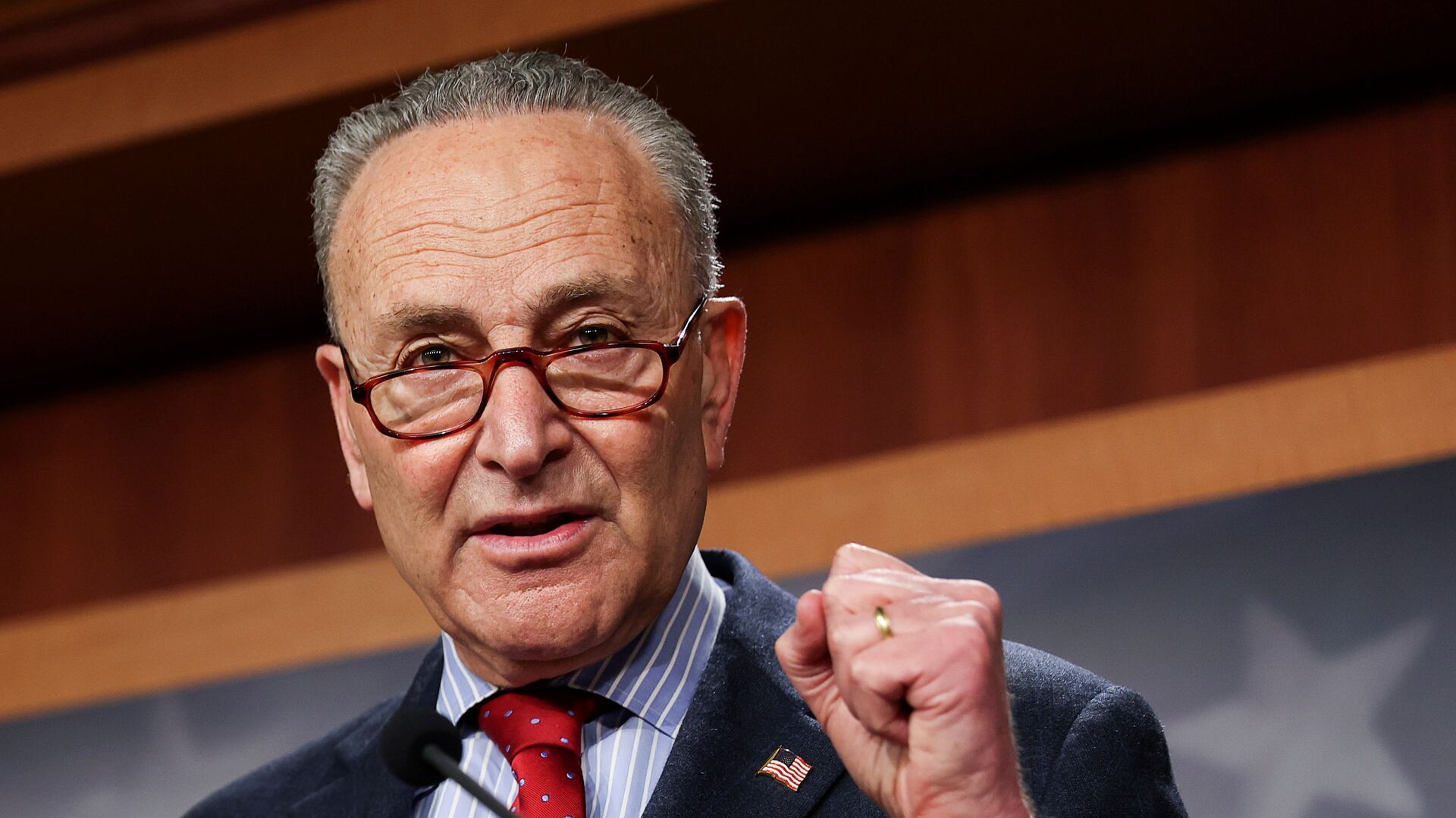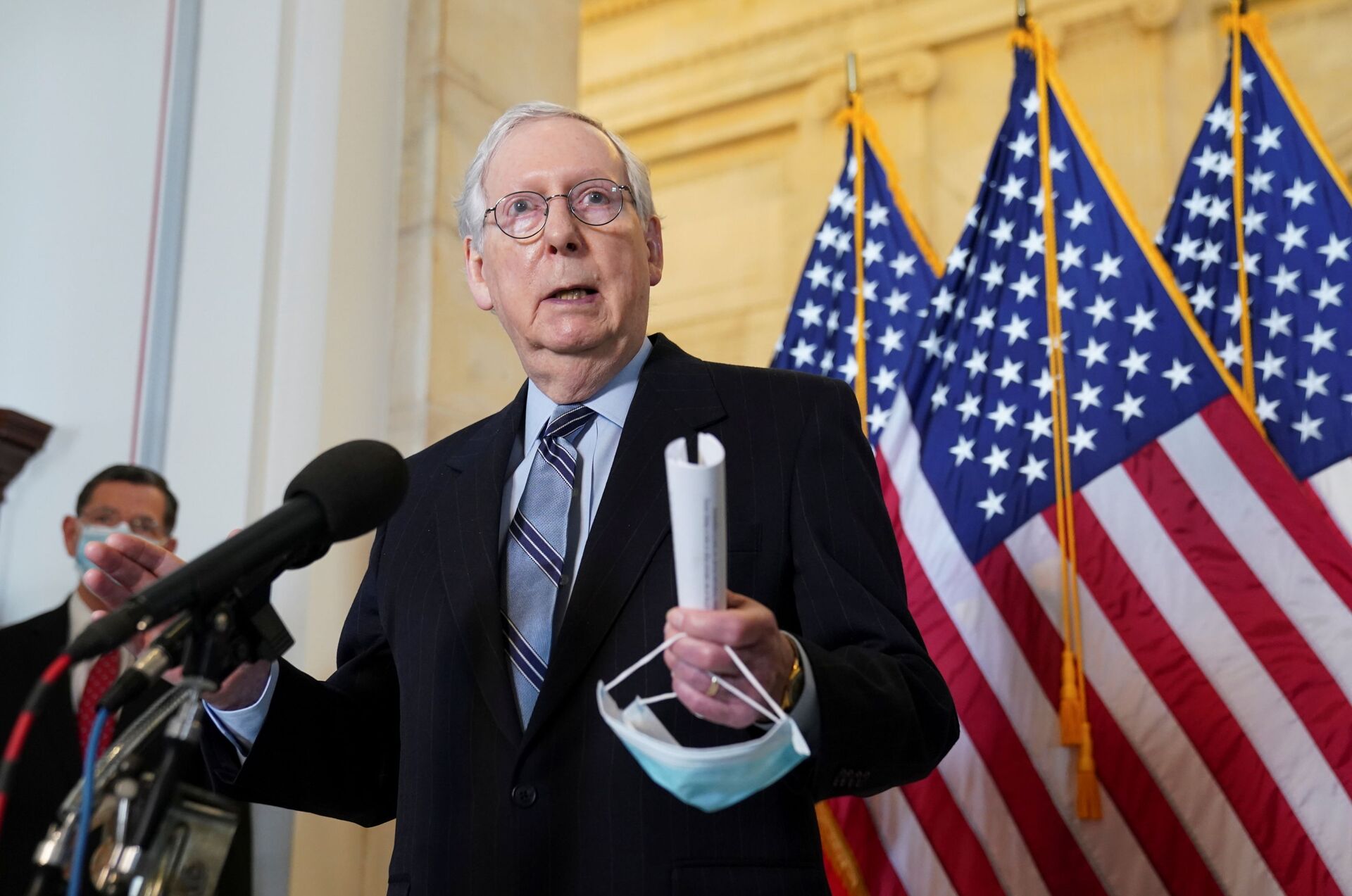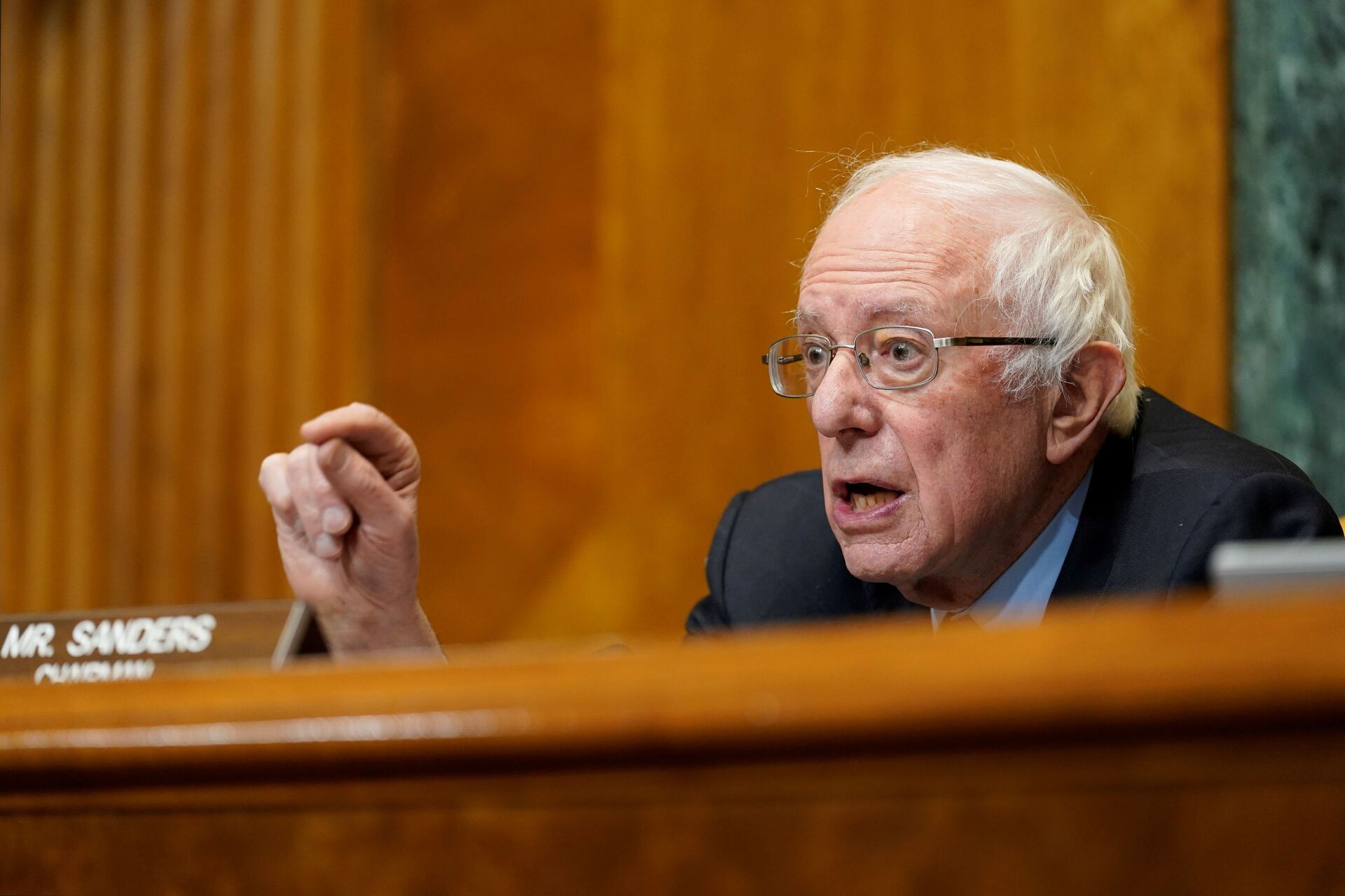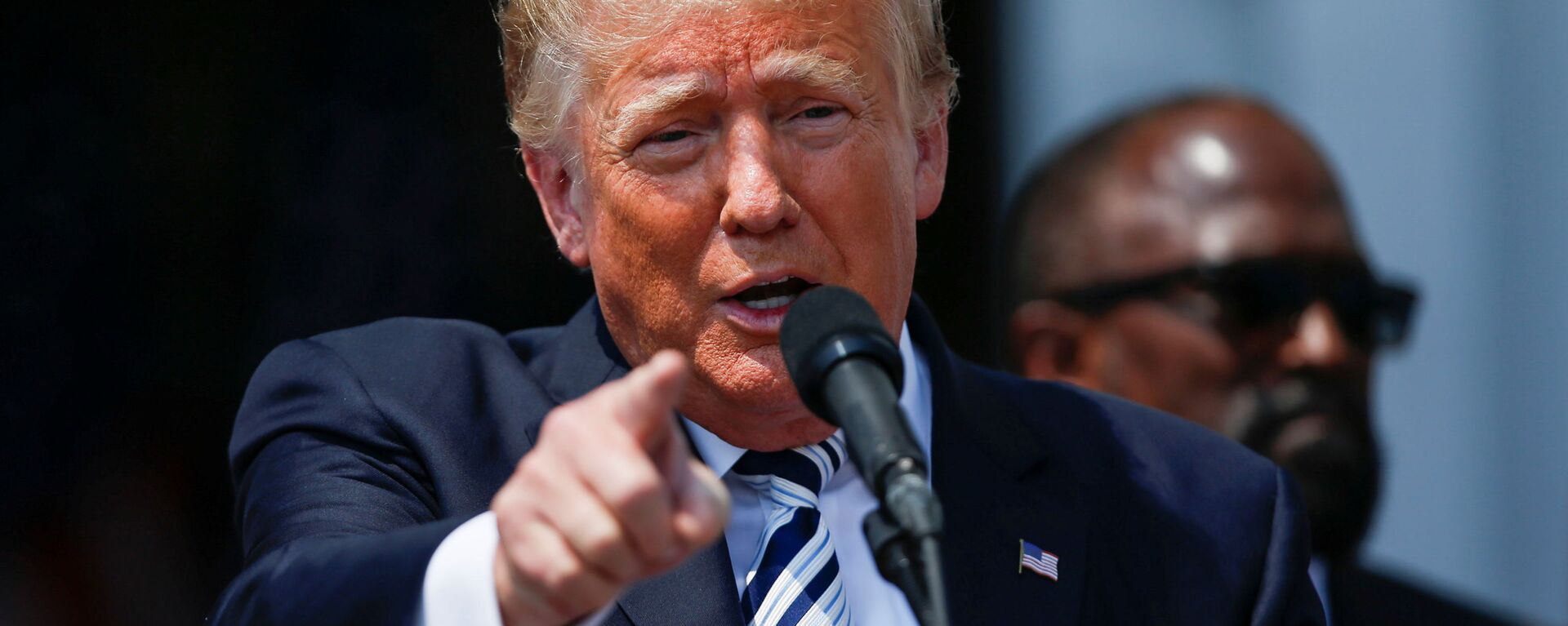https://sputnikglobe.com/20210809/dems-unveil-plan-for-unilaterally-passing-35-trln-infrastructure-bill-without-raising-debt-ceiling-1083565481.html
Dems Unveil Plan for Unilaterally Passing $3.5 Trln Infrastructure Bill Without Raising Debt Ceiling
Dems Unveil Plan for Unilaterally Passing $3.5 Trln Infrastructure Bill Without Raising Debt Ceiling
Sputnik International
Earlier, the Democrats, with the backing of several Republican senators, managed to advance another part of Biden's infrastructure reform – a $1 trillion bill... 09.08.2021, Sputnik International
2021-08-09T18:56+0000
2021-08-09T18:56+0000
2022-08-06T13:22+0000
us
world
newsfeed
debt ceiling
us budget
us senate
https://cdn1.img.sputnikglobe.com/img/07e5/04/04/1082534786_0:33:3017:1730_1920x0_80_0_0_164d8abf53e905b0d6124ccd20a1baf2.jpg
Democrat senators have unveiled a budget resolution which paves the way for the party to pass its $3.5 trillion infrastructure bill by the middle of September. The document instructs Senate Democrats in 12 committees to launch a lengthy negotiating process to determine which budget proposals will make it into the final document.At the same time, despite featuring massive government spending, a major part of which won't be covered by the expected positive effects on the economy from the bill, the resulting budget bill will not feature an increase to the debt ceiling – the limit on how much the government can borrow to implement its policies, projects, and fund government structures. This, in turn, potentially opens an avenue for the Republicans to debate a rise in the debt ceiling separately.Minority Leader Mitch McConnell has already warned the Democrats that the GOP won't be helping them to raise the debt limit once the US reaches it due to the massive $3.5 trillion infrastructure bill, which the Republicans refuse to back.The US debt ceiling was suspended for two years under the Trump administration in 2019, but that came to an end this summer, forcing the Treasury to turn to "extraordinary measures" in order to keep the government functioning. For the issue to be resolved, lawmakers will have to vote in favour of either raising the ceiling or suspending it once again. However, such a move would require the cooperation of the Senate Republicans, which may come in short supply due to the Democrats' plans to cram the $3.5 trillion infrastructure bill through the chamber without taking the GOP's interests into consideration.One-Party Budget BillThe resulting budget bill, costing $3.5 trillion, must be introduced in the upper chamber of the US Congress by 15 September, where the Democrats plan to pass it unilaterally. They do not plan to seek the Republicans' support as they did with the previous part of the infrastructure reform launched by US President Joe Biden – a $1 trillion infrastructure bill which advanced in the Senate on 7 August.The passage of the $3.5 trillion bill will apparently be done via a budget reconciliation – a process that allows a majority party to move budget-related legislation in the Senate without the need to overcome the filibuster. A minority party normally can prevent the dominant one from passing bills unilaterally using the filibuster, but the budget can be passed using a simple majority.This means that Democrats must find common ground on the $3.5 trillion legislation and all vote in favour of advancing it due to their razor-thin majority of 50 votes plus the support of Vice President Kamala Harris. Majority Leader Chuck Schumer has sent a letter to other Senate Democrats instructing them to start work on the bill, which some party members labelled as the most ambitious in decades. Budget Committee chairman, Democrat Bernie Sanders, compared it to the New Deal of Franklin Delano Roosevelt, introduced in the 1930s.The legislation will also apparently include some of the Democrats' long-sought changes that are not directly related to the budget, specifically in the sphere of immigration. The budget resolution mentions a provision that would provide "lawful permanent status for qualified immigrants". While the document does not explicitly indicate the planned limits, it would give green cards "to millions of immigrant workers and families".GOP lawmakers said they will oppose the Democrats' $3.5 trillion bill, arguing it's too expensive. Similar fears were expressed by the other side of the aisle. Senate Democrat Kyrsten Sinema and Joe Manchin said they were concerned by the price tag of the legislation and the possibility of hitting the debt ceiling, which, as the Federal Reserve warned, might have serious consequences for the American economy. While the US has never defaulted, a 2011 row over raising the debt ceiling triggered the first downgrade of the country's sovereign credit rating in its entire history.
https://sputnikglobe.com/20210807/think-twice-trump-warns-gop-lawmakers-against-backing-disgrace-1-trillion-infrastructure-bill-1083550999.html
Sputnik International
feedback@sputniknews.com
+74956456601
MIA „Rossiya Segodnya“
2021
Tim Korso
https://cdn1.img.sputnikglobe.com/img/07e6/03/0d/1093831826_0:0:216:216_100x100_80_0_0_e3f43a960af0c6c99f7eb8ccbf5f812c.jpg
Tim Korso
https://cdn1.img.sputnikglobe.com/img/07e6/03/0d/1093831826_0:0:216:216_100x100_80_0_0_e3f43a960af0c6c99f7eb8ccbf5f812c.jpg
News
en_EN
Sputnik International
feedback@sputniknews.com
+74956456601
MIA „Rossiya Segodnya“
Sputnik International
feedback@sputniknews.com
+74956456601
MIA „Rossiya Segodnya“
Tim Korso
https://cdn1.img.sputnikglobe.com/img/07e6/03/0d/1093831826_0:0:216:216_100x100_80_0_0_e3f43a960af0c6c99f7eb8ccbf5f812c.jpg
us, newsfeed, debt ceiling, us budget, us senate
us, newsfeed, debt ceiling, us budget, us senate
Dems Unveil Plan for Unilaterally Passing $3.5 Trln Infrastructure Bill Without Raising Debt Ceiling
18:56 GMT 09.08.2021 (Updated: 13:22 GMT 06.08.2022) Earlier, the Democrats, with the backing of several Republican senators, managed to advance another part of Biden's infrastructure reform – a $1 trillion bill that is now practically set to be adopted by the upper chamber.
Democrat senators have unveiled a budget resolution which paves the way for the party to pass its $3.5 trillion infrastructure bill by the middle of September. The document instructs Senate Democrats in 12 committees to launch a lengthy negotiating process to determine which budget proposals will make it into the final document.
At the same time, despite featuring massive government spending, a major part of which won't be covered by the expected positive effects on the economy from the bill, the resulting budget bill will not feature an
increase to the debt ceiling – the limit on how much the government can borrow to implement its policies, projects, and fund government structures. This, in turn, potentially opens an avenue for the Republicans to debate a rise in the debt ceiling separately.
Minority Leader Mitch McConnell has already warned the Democrats that the GOP won't be helping them to raise the debt limit once the US reaches it due to the massive $3.5 trillion infrastructure bill, which the Republicans refuse to back.
"Here’s the comedy, they won’t let Republicans have any say in this monstrosity but they want our help raising their credit card to make it happen. Democrats want Republicans to help them raise the debt limit so they can keep spending historic sums of money with zero Republican input and zero Republican votes", McConnell said.
The US debt ceiling was suspended for two years under the Trump administration in 2019, but that came to an end this summer, forcing the Treasury to
turn to "extraordinary measures" in order to keep the government functioning. For the issue to be resolved, lawmakers will have to vote in favour of either raising the ceiling or suspending it once again. However, such a move would require the cooperation of the Senate Republicans, which may come in short supply due to the Democrats' plans to cram the $3.5 trillion infrastructure bill through the chamber without taking the GOP's interests into consideration.
The resulting budget bill, costing $3.5 trillion, must be introduced in the upper chamber of the US Congress by 15 September, where the Democrats plan to pass it unilaterally. They do not plan to seek the Republicans' support as they did with the previous part of the infrastructure reform launched by US President Joe Biden –
a $1 trillion infrastructure bill which advanced in the Senate on 7 August.
The passage of the $3.5 trillion bill will apparently be done via a budget reconciliation – a process that allows a majority party to move budget-related legislation in the Senate without the need to overcome the filibuster. A minority party normally can prevent the dominant one from passing bills unilaterally using the filibuster, but the budget can be passed using a simple majority.
This means that Democrats must find common ground on the $3.5 trillion legislation and all vote in favour of advancing it due to their razor-thin majority of 50 votes plus the support of Vice President Kamala Harris. Majority Leader Chuck Schumer has sent a letter to other Senate Democrats instructing them to start work on the bill, which some party members labelled as the most ambitious in decades. Budget Committee chairman, Democrat Bernie Sanders, compared it to the New Deal of Franklin Delano Roosevelt, introduced in the 1930s.
"Now is the time for bold action. Now is the time to restore faith in ordinary Americans that their government can work for them, and not just wealthy campaign contributors", Sanders said.
The legislation will also apparently include some of the Democrats' long-sought changes that are not directly related to the budget, specifically in the sphere of immigration. The budget resolution mentions a provision that would provide "lawful permanent status for qualified immigrants". While the document does not explicitly indicate the planned limits, it would give green cards "to millions of immigrant workers and families".
GOP lawmakers said they
will oppose the Democrats' $3.5 trillion bill, arguing it's too expensive. Similar fears were expressed by the other side of the aisle. Senate Democrat Kyrsten Sinema and Joe Manchin said they were concerned by the price tag of the legislation and the possibility of hitting the debt ceiling, which, as the Federal Reserve warned, might have serious consequences for the American economy. While the US has never defaulted, a 2011 row over raising the debt ceiling triggered the first downgrade of the country's sovereign credit rating in its entire history.






